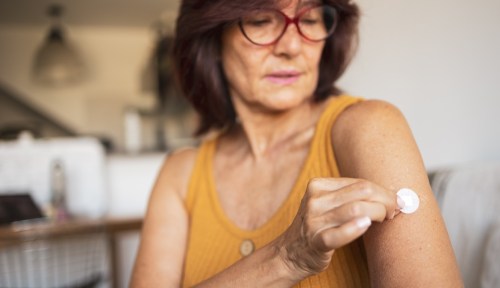The internet went wild last month over a the news of a new treatment promising to potentially delay menopause for decades. The procedure, currently offered by British IVF clinic ProFam, involves surgically removing, freezing, and later re-implanting a piece of ovarian tissue from a person’s own body to boost their estrogen levels later in life. But as science-fiction as it sounds, the technique isn’t new at all.
Known as ovarian grafting, it’s a spin on a decades-old procedure for young women who are undergoing chemo and radiation. Doctors have been cryopreserving (i.e. freezing) and transplanting ovarian tissue for cancer patients since 2000, says Mindy Christianson, M.D., a reproductive endocrinologist and the medical director of the Johns Hopkins Fertility Center, who specializes in preserving the future fertility of young female cancer patients. To date, several hundred babies have been born from this technique, she says.
However, ProFam is taking this existing tech and going one step further. “This [clinic] is using it as a sort of hormone therapy to delay menopause,” says Dr. Christianson.
While not all experts agree on the potential of this particular procedure to delay menopause (and indeed, it has not been approved in the U.S. for this kind of use case), experts say treatments for the debilitating symptoms of menopause are long overdue. “Menopause is not a good thing for most women. It can bring quite a lot of symptoms that are very unpleasant,” says Norbert Gleicher, M.D., a reproductive endocrinologist and OB/GYN at the Center for Human Reproduction. “We as doctors need to address what menopause means to women.”
Fortunately, ovarian grafts aren’t the only treatment that promises to potentially delay menopause—or at least its debilitating symptoms. In fact, some cutting-edge technology even has the potential to make menopause a thing of the past.
Delaying menopause may come with some (theoretical) health benefits
People with ovaries are born with a set number of eggs (about one million) at birth, says Dr. Christianson. That number gradually decreases over time, until levels start to drop in a person’s late 30s and early 40s. Menopause—defined as not having periods for at least a year—is ultimately triggered when a person’s eggs are gone, so their ovaries stop producing estrogen and progesterone and make lower levels of testosterone. The average person with a uterus starts menopause at age 51, although that depends on a combination of genetics and lifestyle, says Margaret Nachtigall, M.D., a reproductive endocrinologist and OB/GYN at NYU Langone.
There are estrogen receptors throughout the entire body, so unpleasant menopause symptoms appear in some pretty odd places as estrogen levels decline, says Dr. Nachtigall. These include bone density loss, hot flashes, mood swings, trouble sleeping, vaginal dryness, and low sex drive. Since estrogen is also a natural insulin sensitizer, when it disappears it’s as though you’re less sensitive to your own insulin, making it harder to maintain a healthy weight. These symptoms technically can start 10 years before menopause at the start of ovarian decline (a period known as perimenopause).
Since declining estrogen levels at menopause have been linked to higher levels of bad LDL cholesterol, increased heart disease risk, and increased osteoporosis risk, in theory delaying menopause may be good for health. Studies suggest that a boost in estrogen levels from hormone therapy may lead to stronger bones. Estrogen therapy also may decrease the risk of heart disease by reducing the amount of plaque that forms in blood vessels, explains Dr. Nachtigall.
The same effects may theoretically extend to the brain. Estrogen might improve sleep and memory, as well as reduce the risk of Alzheimer’s by reducing plaque formation in the brain—although those benefits are unsure and research is ongoing. “Anecdotally estrogen immediately improves cognitive function, such as noun retrieval,” says Dr. Nachtigall. “Around the time of perimenopause, may women say they’re just not themselves. They can’t think, they forget things. When women take estrogen, it improves blood flow to brain.”
That said, menopause is a natural part of reproductive life—and there’s likely a lot about it that we still don’t understand. “Nature is usually pretty smart, and there are reasons why things change as we get older. There may be a purpose to the fact that women’s estrogen declines, so we can’t be sure that delaying menopause won’t cause harm,” cautions Dr. Gleicher.
Hormone therapy is the gold standard in menopause care…for now
Today, hormone therapy—which involves taking synthetic estrogen in combination with progesterone or antiestrogen to protect the uterus—is the preferred treatment for menopause symptoms like hot flashes and mood swings. Some women also take a low dose of synthetic testosterone, which isn’t FDA-approved but some research suggests may improve energy, mood, and libido.
Hormone therapy doesn’t delay menopause, because it can’t make you produce more eggs. But it can treat the debilitating symptoms associated with the condition. “It can be life-changing,” says Dr. Christianson.
Dr. Nachtigal says that hormone therapy is generally considered to be safe, but like any treatment, it comes with its own set of risks. Hormone therapy may increase the risk of blood clots in some women who are at risk of a clotting condition like deep vein thrombosis. It’s also not recommended for women who’ve had some types of breast cancer and liver disease. (Older studies found that breast cancer risk was increased for all people who took estrogen and progesterone combined hormone therapy, but subsequent studies have had mixed results.) Dr. Nachtigall says that the sooner you start estrogen therapy with menopause, the greater the potential benefits—and that starting too late (20+ years post-menopause) can actually increase these same health risks.
How modern medicine might make menopause a thing of the past
Some promising treatments on the horizon might delay or potentially abolish menopause—although a lot more research needs to be done to prove their effectiveness and safety. “We live in amazing times in reproductive medicine. We will over the next decade unquestionably see major new developments, with the ultimate goal being the potential ability to produce fresh eggs,” says Dr. Gleicher.
First, there are those ovarian grafts typically used for cancer patients. Doctors surgically remove the top part of the ovary where eggs lie, cut the piece into tiny strips, and freeze it. Years later, the strips are re-implanted, usually in the pelvic wall or the forearm, where they then (hopefully) begin producing estrogen. “Over time they develop into mini-ovaries that ovulate,” says Dr. Gleicher. Unlike hormone therapy, where doctors aim to use the lowest amount of estrogen to treat symptoms as possible, the grafts more closely match the exact levels of estrogen a woman naturally produced prior to menopause.
All three experts caution that the procedure is still very experimental for delaying menopause. “The big question is how long will the graft last?” says Dr. Christianson. Most grafts today usually last only about two years at most (although some can last for as long as 10 years)—and that’s using healthy tissue from people in their teens to 20s, she says. The older you are when the tissue is removed, the less effective the procedure will be and the less time it will last. “Someone in their 30s already has lower egg supply, so you’re not going to get as long of a benefit,” says Dr. Christianson, making the procedure potentially not worth it for some people. “Will people opt to have surgery to [delay] menopause by two or three years?” asks Dr. Nachtigall.
Ovarian grafts also aren’t cheap. Dr. Christianson says fertility-preserving procedures for young women undergoing cancer treatments cost well over $20,000. Because they are still considered experimental, they’re not covered by insurance. To that end, Dr. Gleicher worries that the still-early research may be used to push the procedure into routine care “because some people think they could make money off of it…We shouldn’t introduce treatments into general practice until we know how effective it is and the downsides,” he says.
Dr. Gleicher is more intrigued by one other potential treatment for menopause. Scientists are working to create entirely new eggs and even ovaries in the lab using other cells—like skin cells—from a woman’s own body. Experiments in mice have already turned blood cells into stem cells, which then they turned into immature eggs, he notes. Other experiments have begun the first steps to creating artificial ovaries in mice.
We’re still a ways away from this—these experiments were performed in mice, and extensive human trials would still be needed to prove efficacy and safety. Still, Dr. Gleicher is confident that scientists will know how to create both ovaries and eggs in the lab for humans within 10 years. “Once we do, the age limit for women to get pregnant may disappear,” he says—and with it, so could menopause.
What can be done now to delay menopause
“The best way to [delay] menopause is not smoking, eating well, and exercising regularly,” says Dr. Nachtigall. Research published in the BMJ last year suggested diet may be predictive of age at natural menopause. (Specifically, the study found that diets high in oily fish and fresh legumes was associated with a delay in menopause by an average of three years.)
Otherwise, there are certain products that can help address certain symptoms. For example, DHEA, an OTC version of a hormone that our bodies use to make testosterone, is FDA-approved to treat vaginal dryness. A number of studies have suggested DHEA can improve sex drive in older women, notes Dr. Gleicher (who co-authored one of these studies), and it’s sometimes used by women going through IVF to improve ovarian function, adds Dr. Nachtigall—although no studies prove these benefits. “I can’t really speak to its value, but I also don’t see great harm in very low doses,” Dr. Nachtigall says.
Dr. Nachtigall adds there are lots of other unproven but potentially effective OTC treatments for menopause symptoms, including Femaralle (DT56A) to reduce hot flashes and improve bone density, and hyaluronic acid to help with vaginal dryness. Just be sure you don’t start taking any supplements without talking to your doctor to ensure they don’t interfere with any other medications you’re taking.
Research into menopause treatments continues—albeit at a snail’s pace. “Menopause is a very important condition that hasn’t received the attention it deserves,” says Dr. Gleicher. Finally, it seems like science is willing to spotlight it.
Looking for more info on menopause? This startup wants to provide answers (and solutions). And should we rethink how we approach fertility?
Sign Up for Our Daily Newsletter
Get all the latest in wellness, trends, food, fitness, beauty, and more delivered right to your inbox.
Got it, you've been added to our email list.











